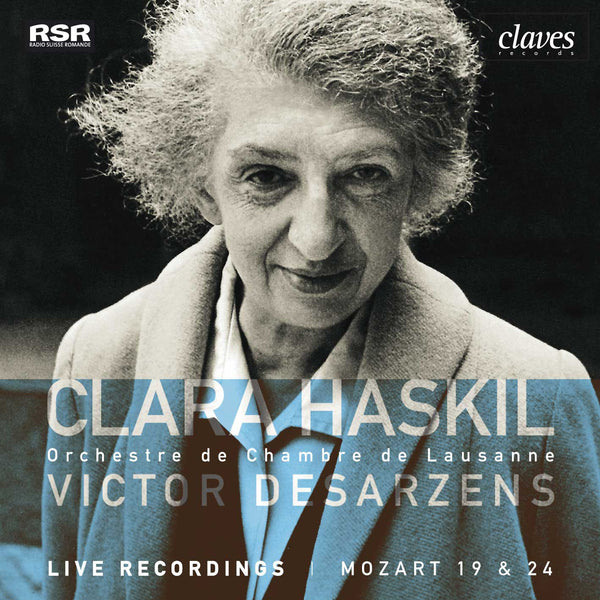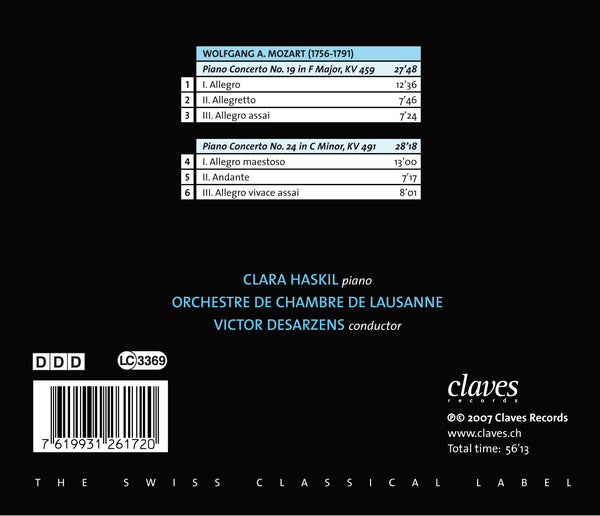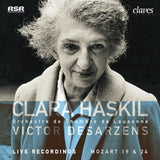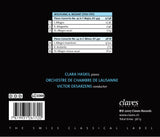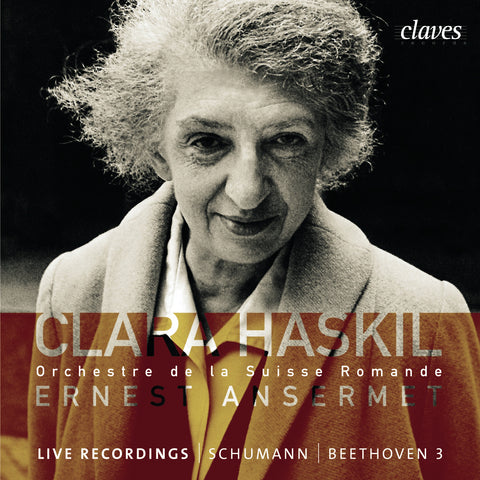(2007) Mozart: Piano Concertos K. 459 & K. 491
Category(ies): Concerto Piano Rarities
Instrument(s): Piano
Main Composer: Wolfgang Amadeus Mozart
Orchestra: Orchestre De Chambre De Lausanne
Conductor: Victor Desarzens
CD set: 1
Catalog N°:
CD 2617
Release: 2007
EAN/UPC: 7619931261720
- UPC: 829410378673
This album is now on repressing. Pre-order it at a special price now.
CHF 18.50
This album is no longer available on CD.
This album has not been released yet. Pre-order it from now.
CHF 18.50
This album is no longer available on CD.
This album is no longer available on CD.
VAT included for Switzerland & UE
Free shipping
This album is now on repressing. Pre-order it at a special price now.
CHF 18.50
This album is no longer available on CD.
This album has not been released yet.
Pre-order it at a special price now.
CHF 18.50
This album is no longer available on CD.
This album is no longer available on CD.
MOZART: PIANO CONCERTOS K. 459 & K. 491
Mozart
Mozart made up the majority of her recordings; including some of his most beautiful concertos. In addition to her studio recordings there also exist a number of live recordings of Clara Haskil; with all of the “hazards” inherent to this technique; of course; but also with the stimulating presence of an audience. And in the case of Clara Haskil that meant an audience immediately entranced by the charm of this gray-haired; bent and hobbly woman who once seated at the instrument and her long fingers touched the keys was transformed; transcending the music. There already exist five releases of the Piano Concerto No. 19 in F Major; K. 459; with the conductors Swoboda; Fricsay (2 times); Schuricht and Silvestri; and six versions of the Piano Concerto No. 24 in C Minor; K. 491; with Cluytens; Karajan; Munch; Hindemith; Klemperer and Markevitch. One thus might be tempted at first to say with regard to this new CD: “Another one!?”
Unique testimony
But this would not be just because this recording does have something very unique to offer. When I was listening to the tapes her sisters had collected of Clara Haskil’s concerts in her modest but charming apartment in Vevey I was struck by her performances under the direction of Victor Desarzens; particularly the Concerto No. 19 in F Major. Her performance here was marked by a sense of serenity that is rarely to be found with such singleness; with such constancy from the beginning to the end of a work. In this sense it is quite unique among the recordings she left. To such a degree that I tried to release this recording; but I had to give up the thought in view of the insurmountable problems with the rights at the time. I am very happy that Radio Suisse Romande is now finally able to release this rare recording on CD in collaboration with Claves Records.
At the peak of her career
It should be noted that 1956 and most of 1957 were very good years for Clara Haskil; without a doubt the most radiant in her career. Although always suspect of her sudden and unexpected triumphs; she was nonetheless content. Although never ceasing to criticize herself with unjustified severity; she began to believe in her career. When she performed the Concerto in C Minor in Lausanne on 25 June 1956 she was in the midst of the most fulfilling year of her musical career. Even if she did not enjoy her earlier vitality she was still in sovereign command of her instrument; coaxing unsuspected nuances in sonority from it. She mesmerized her audiences and was answered everywhere by standing ovations. It was the evening before her departure with Carl Schuricht for a brilliant concert tour through Germany and Switzerland; and only a few weeks later she would depart (against her desires!) for the United States where he performances created amazement among audiences and critics alike. Forgetting her reservations she found herself truly happy there.
Seriously ill
The intensity of her concert activities continued into the following year and was without a doubt too taxing; she began to feel an unsettling; growing sense of fatigue. In fact; the F-major concerto that she performed with Desarzens in Lausanne on 14 October (a concert that was repeated in Fribourg on the 22nd) would prove to be one of her last public appearances in 1957. The day after a brilliant performance of Beethoven’s Third Piano Concerto a few days later in Paris under the direction of Georges Tzipine she fell so seriously ill that one did not expect her to survive. After a forced discontinuation of all her activities for some four months she resumed performing; much too early; to be sure; and promptly suffered an infarct that forced her to interrupt her concert activities for another five months.
Miracle
Clara Haskil was able to go back to her public and embrace their “love” again (because it really was love); but she never did recover her full strength again. And never again would she have the opportunity to perform with Desarzens and the Orchestre de Chambre de Lausanne; never again in front of the Vaudoise public that had remained faithful to her since her earliest years; and never again would she enjoy such confidence as on that day (14 October 1957) in Lausanne; in an atmosphere of intimate familiarity that allowed her (in spite of her humility and self-doubts) to offer the best of her ineffable genius as a performer. In spite of the age of the recording and a few instrumental imperfections; the balance between orchestra and soloist is excellent; remarkably present. Listen to her miraculous playing; which unfortunately is never completely conveyed on any of her recordings: but what does shine through already represents something of a miracle.
Jérôme Spycket (Translation: Mark Manion)
There is not a music lover in the world who is not familiar with Clara Haskil and her dramatic destiny; thwarted by illness and two wars… And the obstinate manner with which she disparaged herself! There is not a music lover in the world who does not know that the glorious career of this musician was in fact very short – scarcely ten years in duration; beginning in her fifties. This explains why her list of recordings is so short and limited to such a small number of works (in view of her repertoire during the 1920’s to the 1940’s and in comparison to her contemporaries Rubinstein or Horowitz; one can only dream of what this list of recordings might have included; forceful works such as the concertos by Brahms or by Rachmaninov; or the “Emperor”…).
Mozart
Mozart made up the majority of her recordings; including some of his most beautiful concertos. In addition to her studio recordings there also exist a number of live recordings of Clara Haskil; with all of the “hazards” inherent to this technique; of course; but also with the stimulating presence of an audience. And in the case of Clara Haskil that meant an audience immediately entranced by the charm of this gray-haired; bent and hobbly woman who once seated at the instrument and her long fingers touched the keys was transformed; transcending the music. There already exist five releases of the Piano Concerto No. 19 in F Major; K. 459; with the conductors Swoboda; Fricsay (2 times); Schuricht and Silvestri; and six versions of the Piano Concerto No. 24 in C Minor; K. 491; with Cluytens; Karajan; Munch; Hindemith; Klemperer and Markevitch. One thus might be tempted at first to say with regard to this new CD: “Another one!?”
Unique testimony
But this would not be just because this recording does have something very unique to offer. When I was listening to the tapes her sisters had collected of Clara Haskil’s concerts in her modest but charming apartment in Vevey I was struck by her performances under the direction of Victor Desarzens; particularly the Concerto No. 19 in F Major. Her performance here was marked by a sense of serenity that is rarely to be found with such singleness; with such constancy from the beginning to the end of a work. In this sense it is quite unique among the recordings she left. To such a degree that I tried to release this recording; but I had to give up the thought in view of the insurmountable problems with the rights at the time. I am very happy that Radio Suisse Romande is now finally able to release this rare recording on CD in collaboration with Claves Records.
At the peak of her career
It should be noted that 1956 and most of 1957 were very good years for Clara Haskil; without a doubt the most radiant in her career. Although always suspect of her sudden and unexpected triumphs; she was nonetheless content. Although never ceasing to criticize herself with unjustified severity; she began to believe in her career. When she performed the Concerto in C Minor in Lausanne on 25 June 1956 she was in the midst of the most fulfilling year of her musical career. Even if she did not enjoy her earlier vitality she was still in sovereign command of her instrument; coaxing unsuspected nuances in sonority from it. She mesmerized her audiences and was answered everywhere by standing ovations. It was the evening before her departure with Carl Schuricht for a brilliant concert tour through Germany and Switzerland; and only a few weeks later she would depart (against her desires!) for the United States where he performances created amazement among audiences and critics alike. Forgetting her reservations she found herself truly happy there.
Seriously ill
The intensity of her concert activities continued into the following year and was without a doubt too taxing; she began to feel an unsettling; growing sense of fatigue. In fact; the F-major concerto that she performed with Desarzens in Lausanne on 14 October (a concert that was repeated in Fribourg on the 22nd) would prove to be one of her last public appearances in 1957. The day after a brilliant performance of Beethoven’s Third Piano Concerto a few days later in Paris under the direction of Georges Tzipine she fell so seriously ill that one did not expect her to survive. After a forced discontinuation of all her activities for some four months she resumed performing; much too early; to be sure; and promptly suffered an infarct that forced her to interrupt her concert activities for another five months.
Miracle
Clara Haskil was able to go back to her public and embrace their “love” again (because it really was love); but she never did recover her full strength again. And never again would she have the opportunity to perform with Desarzens and the Orchestre de Chambre de Lausanne; never again in front of the Vaudoise public that had remained faithful to her since her earliest years; and never again would she enjoy such confidence as on that day (14 October 1957) in Lausanne; in an atmosphere of intimate familiarity that allowed her (in spite of her humility and self-doubts) to offer the best of her ineffable genius as a performer. In spite of the age of the recording and a few instrumental imperfections; the balance between orchestra and soloist is excellent; remarkably present. Listen to her miraculous playing; which unfortunately is never completely conveyed on any of her recordings: but what does shine through already represents something of a miracle.
Jérôme Spycket (Translation: Mark Manion)
Return to the album | Composer(s): Wolfgang Amadeus Mozart | Main Artist: Clara Haskil







